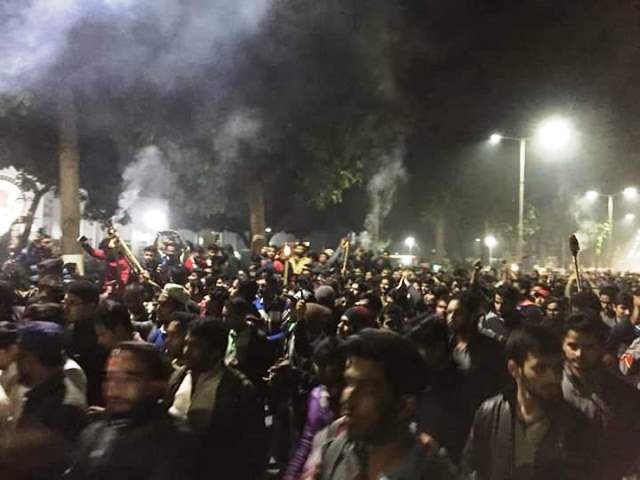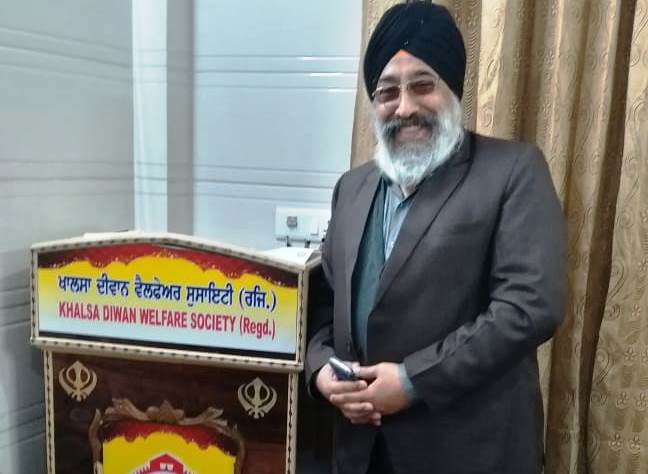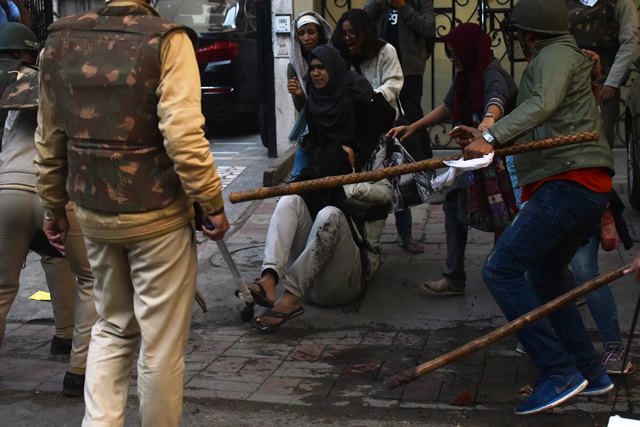In an impassioned speech to mark the launch of his party’s campaign for the Delhi elections, Prime Minister Narendra Modi repeatedly assured Indian Muslims that the recently enacted Citizenship Amendment Bill (CAA) or the proposed roll-out of the National Register of Citizens (NRC) would not discriminate against those who were born in India. This comes in the wake of widespread protests, mainly by urban students, across India. The protests, including violent incidents leading to destruction of public property and clashes with police, spread across India, before being quelled.
What were the reasons for the sudden and spontaneous uprising by students? Mr Modi and his colleagues in the ruling Bharatiya Janata Party (BJP) attribute it to their political rivals, chiefly the Congress party, who they claim have provoked the agitations by the students in order to gain electoral advantage in the forthcoming state elections, notably in Delhi, which goes to the polls in early 2020. But Mr Modi’s critics and the student agitators believe that the CAA and, potentially, the NRC, discriminate against Muslims, while they favour almost all other religious minorities. The Act and the register, critics feel, will further marginalise India’s population of 200 million Muslims and turn the country into a majoritarian state, dominated by Hindus, which is contrary to the secularist tenet of the nation’s Constitution.
What exactly does the CAA intend to do? Primarily, the Act amends the existing Indian Citizenship law, which prohibits illegal migrants from becoming Indian citizens. The old law prohibits illegal foreigners who enter India without valid visas or travel documents from staying in the country and denies them Indian citizenship. Under the new Act, which Mr Modi’s government has formulated, there are exceptions to that law. Now, Hindus, Christians, Sikhs, Parsis, and jains (notably not Muslims), if they have genuinely immigrated from Pakistan, Bangladesh or Afghanistan, will be allowed to stay in India and can be eligible for citizenship if they live or work in the country for six years. The government believes that this will provide sanctuary to those who have fled other countries because of religious persecution.
What then is the controversy surrounding the CAA? The Modi regime’s critics argue that the new Act discriminates against Muslims and, therefore, goes against the secular principles in the Indian Constitution. By separating Mulsims and non-Muslims, the Act, critics feel incorporates religious discrimination into a law and that runs counter to India’s long-standing secular principles. If illegal immigrants from other religions are allowed to seek refuge legally in India, why not also the Muslims who are persecuted in other countries. People belonging to certain sects in Pakistan (Ahmadis, for instance) or in Myanmar (Rohingyas) face oppression and persecution in their countries. Why should they be denied sanctuary? they ask.
What is the controversy over the NRC? The NRC is a register of people who are able to show proper credentials to prove that they came to India before March 24, 1971, the eve of the formation of Bangladesh (formerly East Pakistan), which neighbours India. Initially, the register was introduced in Assam, which has for decades faced a problem of illegal immigrants from Bangladesh. Before the register was published, the BJP government had rooted for it but after it was found to be ridden by errors—millions, primarily Bengali Hindus, were excluded—it was scrapped and could now be re-framed. The CAA and the NRC are interlinked. Now, non-Muslims who were exclude from the register could seek citizenship and not face deportation, particularly in states such as Assam.
The Modi regime, led by Home minister Amit Shah, now wants to roll out the NRC across all Indian states. This would mean illegal immigrants would have to prove their credentials in order to be entitled to permission to stay on in India. Critics believe that coupled with the CAA this could discriminate against Muslims who have migrated to India and have been staying in the country for a long time. Non-Muslims who are not on the NRC could be protected by the CAA and, hence, seek citizenship by naturalisation, while Muslims who are on listed on the register would be denied the right to stay.
What is the provocation for the protests? The student agitation—which Mr Modi and his colleagues in government say is a movement by “urban Naxals” (a reference to the ultra-Left Wing violent uprisings that peaked in the 1970s)—is fuelled by the view that the new law would discriminate against the largest minority community in India (the 200 million Muslims in India make it the country with the largest Muslim population outside of countries that are Muslim dominated) and , therefore, not only violate secularist principles but drive in the wedge further between the Muslim minority and the Hindu majority. A citizenship law that is based on religious affiliation destroys the secularist fabric of India, critics argue. But the student protests have to be viewed from a broader perspective.
The trigger point for the recent agitation by students was the CAA and NRC and the first protests took place in or around the campuses of two Muslim-centric universities—Aligarh Muslim University in Uttar Pradesh and the Jamia Millia Islamia University in Delhi. They quickly spread to other universities in India where students empathised with the protesters and organised their rallies, marches and assemblies. However, there have been other build-ups to the actual protests. The Modi regime is viewed by students as being intolerant and non-secularist. In particular, students have been apprehensive about recent developments that have demonstrated discriminatory trends.
The crackdown in Kashmir where leaders were put under house arrest, and communication was blocked after the government repealed special status for the Muslim-majority state is one provocation for the restiveness that has come to prevail on Indian university campuses. The Babri Masjid verdict, which, in essence, gives the go ahead for Hindu activists to gain control over a plot of land where an old mosque stood (it was demolished by Hindu activists in 1992) and build a temple dedicated to the mythological figure, Rama, is yet another point of discord.
India’s students are a significant force. As much as 50% of Indians are below the age of 25 and in recent years many of them feel insecure both economically as well as socially. Unemployment rates are high (although authentic data are difficult to access in India); the economy has been slowing down; consumer demand and, as a consequence, investment by industry is at its nadir. Increasingly, this is making India’s youth disenchanted with the establishment. The recent protests could, thus, be a foretaste of more serious agitations. It is time the Modi regime took note of the stark writing on the wall.




